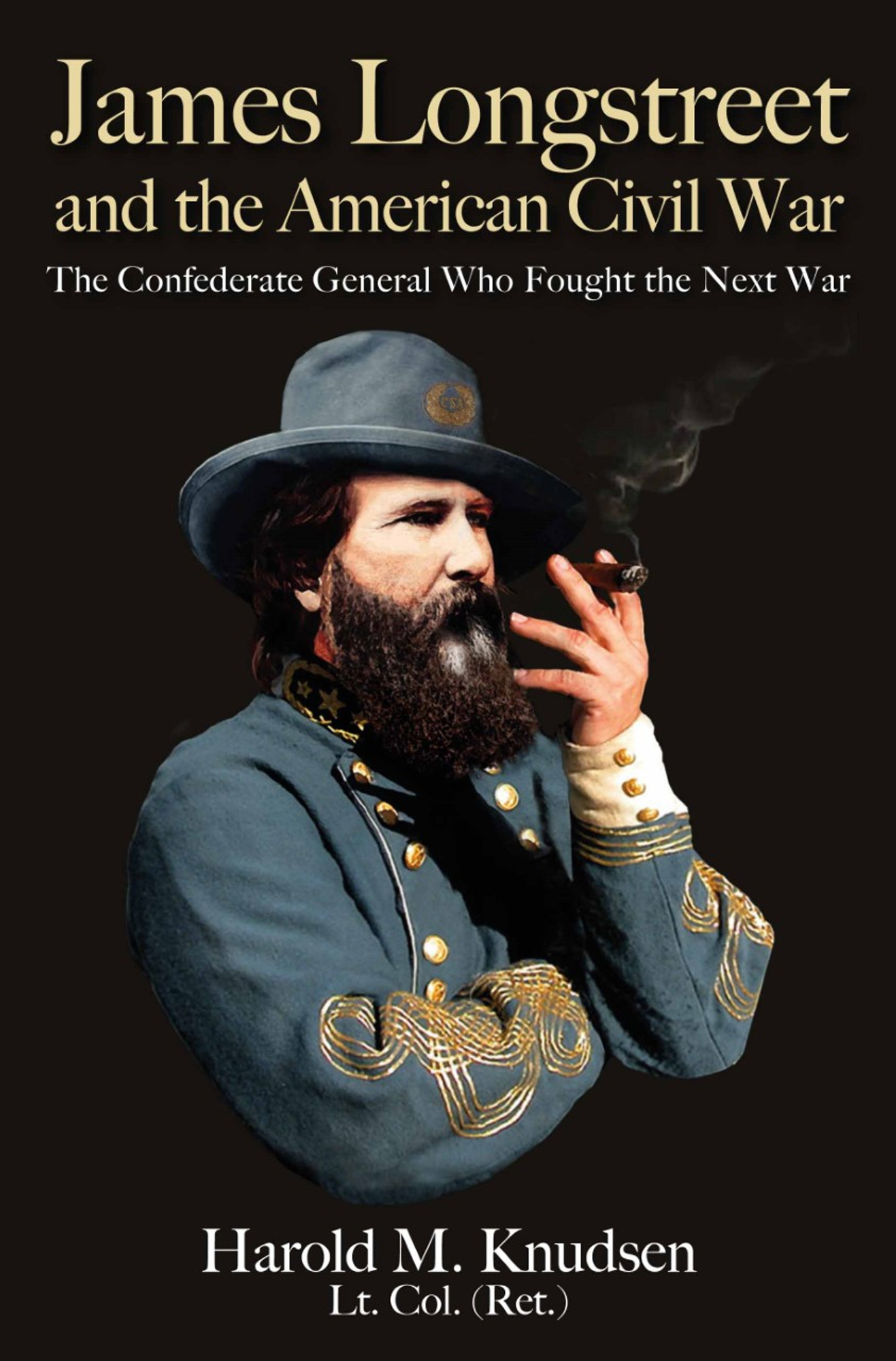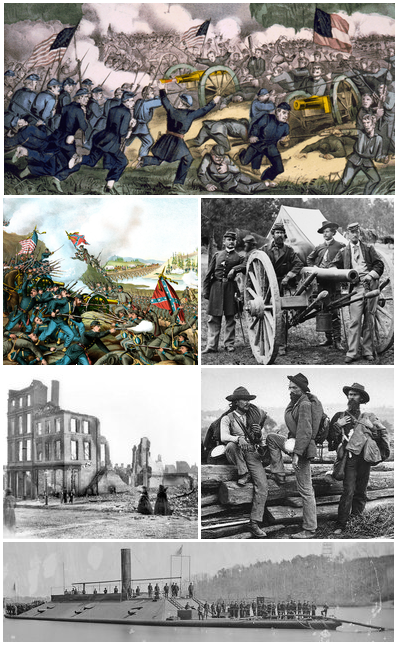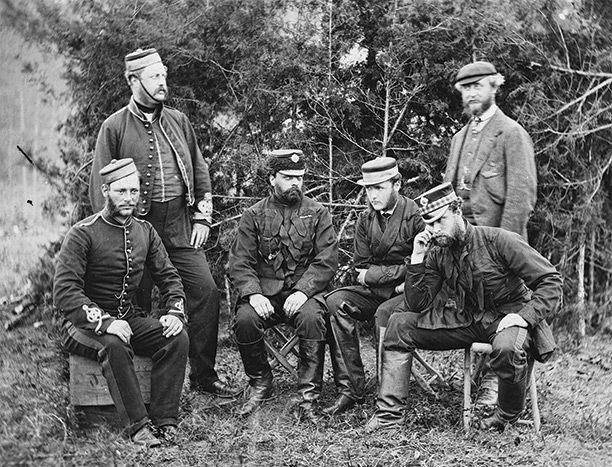The American Civil War lasted from 1861 to 1865. It was fought between the Union (Northern states) and the Confederacy (Southern states).
The American Civil War, a pivotal conflict in U. S. History, erupted due to deep-seated differences between the North and South. The Union, comprising Northern states, opposed the Confederacy, formed by Southern states. Critical issues like states’ rights, economic disparities, and, most significantly, slavery fueled the war.
The North, led by President Abraham Lincoln, sought to preserve the Union and end slavery. The South, under President Jefferson Davis, aimed to maintain their way of life, which included slavery. The war resulted in significant loss of life and reshaped the nation’s future, leading to the abolition of slavery and the eventual reunification of the country.

Credit: www.savasbeatie.com
The American Civil War Battlefield
The American Civil War was a conflict that shaped the nation. The fate of the United States was decided on the battlefield, where soldiers from the North and the South clashed in bloody battles. These battles were brutal and relentless, with high stakes for both sides.
Union Versus Confederacy
The war was fought between the Union and the Confederacy. The Union represented the Northern states, while the Confederacy comprised the Southern states that seceded. Each side had its own leaders, strategies, and goals.
| Union | Confederacy |
|---|---|
| Led by President Abraham Lincoln | Led by President Jefferson Davis |
| Fought to preserve the Union | Fought for independence |
| Had more resources and manpower | Experienced military leaders |
Key Battles And Turning Points
Several key battles defined the course of the Civil War and were significant turning points in the conflict.
- Battle of Gettysburg – This battle was a major turning point. The Union Army defeated the Confederates, ending their invasion of the North.
- Battle of Antietam – Known as the bloodiest single-day battle in American history. It led to President Lincoln issuing the Emancipation Proclamation.
- Battle of Fort Sumter—This was the first battle of the Civil War, marking the beginning of the conflict.
- Siege of Vicksburg – The Union gained control of the Mississippi River. This split the Confederacy in two.
These fierce battles often resulted in heavy casualties. They changed the momentum of the war and led to the eventual Union victory.

Credit: en.wikipedia.org
The Union’s Key Figures
Many leaders rose to prominence during the American Civil War. The Union’s key figures played crucial roles in the war, and their decisions and actions shaped the course of history. Let’s explore some of these influential individuals.
Abraham Lincoln: The Presidential Anchor
Abraham Lincoln served as the 16th President of the United States. He led the Union during the Civil War, and his leadership was pivotal in keeping the country united. Lincoln is famous for his dedication to abolishing slavery. His speeches, like the Gettysburg Address, inspired many. Lincoln faced many challenges but remained steadfast.
Lincoln’s decisions were vital to the Union’s success. He appointed key generals and strategized with his advisors. His Emancipation Proclamation was a turning point in the war. This document declared the freedom of all slaves in Confederate-held territory. Lincoln’s vision and resolve were instrumental in guiding the Union to victory.
Ulysses S. Grant: Leading The Charge
Ulysses S. Grant was a prominent Union general who eventually became the Commanding General of the U.S. Army. Grant was known for his tenacity and military prowess. He led many successful campaigns that weakened the Confederacy, his most notable victory being the Battle of Vicksburg.
Grant’s leadership style was aggressive and decisive. He believed in taking the fight to the enemy. His strategies often involved coordinated attacks on multiple fronts, which put constant pressure on Confederate forces. Grant’s persistence and tactical brilliance earned him recognition. Lincoln admired Grant and gave him full command of the Union armies.
Grant’s efforts were crucial in the Union’s eventual victory. His relentless pursuit of Confederate forces led to the surrender of General Robert E. Lee. This event took place at Appomattox Court House in 1865. Grant’s contributions to the Union war effort were significant and lasting.
Confederate Leaders Of Valor
Many brave Confederate leaders participated in the American Civil War. These leaders commanded respect and played significant roles. Their strategies and decisions shaped the course of the war. This section highlights two of the most notable figures.
Jefferson Davis: The Rebel President
Jefferson Davis was the President of the Confederate States. He had a strong military background, serving as a soldier and politician before the Civil War. Davis believed in the South’s right to secede. His leadership was crucial in the Confederacy.
Davis faced many challenges, including organizing a new government and ensuring supplies for his troops. Despite these struggles, Davis remained steadfast and inspired many with his dedication and resolve.
| Aspect | Details |
|---|---|
| Full Name | Jefferson Finis Davis |
| Born | June 3, 1808 |
| Role | President of the Confederate States |
| Military Background | West Point Graduate, Mexican-American War Veteran |
Robert E. Lee: A General’s Dilemma
Robert E. Lee was one of the most respected generals of the Civil War. He led the Confederate Army with skill and honour. Lee was offered command of the Union Army but chose to side with his home state, Virginia.
Lee’s strategies were brilliant. He won many battles against larger Union forces. His leadership was a key factor in the Confederacy’s successes. Despite his skills, Lee faced many tough decisions.
- Born: January 19, 1807
- West Point Graduate: Yes
- Military Experience: Mexican-American War, Superintendent of West Point
- Key Battles: Battle of Antietam, Battle of Gettysburg
Lee’s dedication was unmatched. He was a symbol of Southern pride. His legacy continues to be studied and debated.
Unsung Heroes And Their Stories
The American Civil War was more than just famous generals and epic battles. Behind the scenes, many unsung heroes made significant contributions. These individuals are often overlooked but play crucial roles. Let’s delve into their stories.
Medics And Nurses On The Frontline
Medics and nurses faced extreme conditions on the battlefield. They worked tirelessly to save lives. Clara Barton, known as the “Angel of the Battlefield,” was one such hero. She later founded the American Red Cross.
Dorothea Dix also made a huge impact. She organized and trained nurses, ensuring they were ready to serve. Their efforts reduced the mortality rate significantly.
Spies: The Shadow Warriors
Spies played a vital role in gathering intelligence. They risked their lives to provide crucial information. Harriet Tubman was a conductor on the Underground Railroad and a Union spy. Her efforts helped to free many slaves and gather valuable information.
Another notable spy was Belle Boyd. She provided the Confederates with key intelligence. With their bravery and cunning, these shadow warriors shaped the course of the war.
African American Soldiers In The Conflict
The American Civil War saw many African American soldiers bravely fighting for their freedom and the Union cause. These courageous men faced not only the horrors of war but also prejudice and discrimination. Their contributions were vital in shaping the course of the war and the future of the United States.
The 54th Massachusetts Infantry
The 54th Massachusetts Infantry was one of the first African American regiments organized in the Northern states. Governor John A. Andrew of Massachusetts formed this regiment in 1863. The unit consisted of free African American men and formerly enslaved people.
Their most famous engagement was the July 18, 1863, assault on Fort Wagner in South Carolina. Despite facing heavy casualties, the 54th showed immense bravery and determination. Their actions proved the fighting capabilities and resolve of African American soldiers.
The legacy of the 54th Massachusetts Infantry is honoured in books, films, and monuments. Their sacrifice and heroism remain a significant part of American history.
Freedom Fighters: From Slaves To Soldiers
Many African American soldiers had lived as slaves before the war. When the Union Army began recruiting African Americans, these men seized the opportunity to fight for their freedom. They joined the ranks, eager to contribute to the Union’s efforts and end slavery.
Approximately 180,000 African American men served in the Union Army by the end of the Civil War. They formed nearly 10% of the entire Union fighting force. These soldiers served in various capacities, from infantrymen to labourers, and their roles were crucial to the Union’s success.
Despite facing discrimination and lower pay, African American soldiers remained resolute. They believed in the cause and fought for a future free from bondage. Their courage and determination were pivotal in the Union’s victory and the abolition of slavery.
Here’s a brief summary of their contributions:
| Role | Contribution |
|---|---|
| Infantrymen | Fought in key battles |
| Labourers | Built fortifications and supply lines |
| Scouts and Spies | Provided crucial intelligence |
Their bravery and commitment were a testament to their desire for freedom and equality. The efforts of African American soldiers during the Civil War laid the groundwork for future civil rights advancements.
Women Who Made A Difference
The American Civil War was not just fought by men. Many women also played crucial roles. They served as nurses, spies, and even soldiers. Their bravery and dedication were vital. This section will highlight some of these incredible women.
Clara Barton: Angel Of The Battleground
Clara Barton was a pioneering nurse during the Civil War. She risked her life to bring supplies and support to soldiers in the field. Known as the Angel of the Battlefield, she provided care under fire. Clara also founded the American Red Cross, which still helps people today.
Here are some key contributions of Clara Barton:
- Provided medical care on the front lines
- Organized relief efforts for soldiers
- Founded the American Red Cross
Women In Disguise: Female Soldiers
Some women were so determined to fight that they disguised themselves as men. These female soldiers showed incredible bravery. They faced the same dangers as male soldiers, and their stories were often discovered only after the war.
| Name | Role | Notable Achievements |
|---|---|---|
| Sarah Edmonds | Disguised as Franklin Thompson | Served in the Union Army |
| Frances Clayton | Disguised as Jack Williams | Fought in multiple battles |
These women showed that courage knows no gender. Their contributions were vital to the war effort, and their stories still inspire us.
Legacy Of Valor
The American Civil War was a defining moment in U.S. history. The bravery of those who fought cannot be overstated. Their courage left an indelible mark on the nation. This is the Legacy of Valor they left behind.
Memorials And Monuments
Across the United States, numerous memorials honour Civil War heroes and remind them of their sacrifices. Each statue, plaque, and memorial tells a story.
- Gettysburg National Cemetery: This site honours Union soldiers who died in the Battle of Gettysburg.
- Lincoln Memorial: A tribute to President Abraham Lincoln, who led the nation during the Civil War.
- Confederate Memorial Carving: Located in Georgia, it honours Confederate leaders.
Each site provides a place for reflection, allowing visitors to remember the valour of those who fought.
Literature And Film: Keeping Memories Alive
Books and movies play a crucial role in keeping the memories of the Civil War alive. They bring stories of bravery and sacrifice to new generations.
- “Gone with the Wind”: A novel and film depicting life during the Civil War.
- “The Red Badge of Courage”: A book about a young soldier’s experiences in battle.
- “Glory”: A movie that tells the story of the 54th Massachusetts Infantry Regiment.
These works of literature and film help ensure that the legacy of valour endures. They allow us to understand the experiences of those who fought.

Credit: www.historytoday.com
Frequently Asked Questions
Who Won The American Civil War And Why?
The Union, representing the North, won the American Civil War. They succeeded due to superior resources, better infrastructure, and effective leadership.
Was The Civil War Over Slavery?
Yes, the Civil War was primarily over slavery. The Southern states wanted to maintain slavery, while the Northern states opposed its expansion.
What Did The Confederates Fight For?
The Confederates fought to preserve slavery and maintain states’ rights. They sought independence from the Union to uphold their economic interests and social order.
What Are The Three Main Causes Of The Civil War?
The three main causes of the Civil War are slavery, states’ rights, and economic differences between the North and South.
Conclusion
The American Civil War was a pivotal conflict between the Union and the Confederacy. Understanding who fought helps grasp its historical impact. Both sides displayed immense bravery and conviction. Their battles shaped the nation’s future. Remembering these soldiers honours their sacrifices and preserves our history.
visit more article
